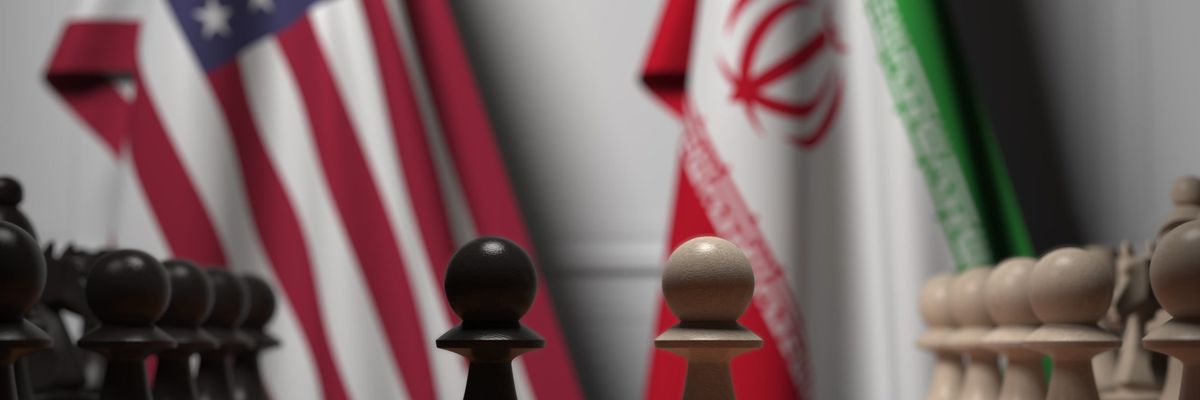When it comes to Iran, there is a persistent belief in Washington that the Cold War experience in confronting the Soviet Union is relevant to dealing with the Islamic Republic. Yet the pundits and policymakers insist on drawing the wrong lessons from that experience.
The latest iteration of this theme is found Karim Sadjadpour’s recent article in The Atlantic, conspicuously titled “How to Win the Cold War with Iran.” In it, Sadjadpour, a senior fellow at the Carnegie Endowment for International Peace, promotes “containment” as a long-term strategy to deal with Iran, similar to the one devised by the American diplomat George Kennan regarding the Soviet Union in 1946.
What Sadjadpour offers, however, amounts to no more than repackaging of the old “dual containment” of Iran and (then Saddam Hussein-led) Iraq dating back to the Clinton presidency. With higher or lower intensity, Washington has pursued that policy ever since, with the JCPOA providing only a brief interlude, and then confined only to the nuclear issue. Dual containment, however, failed to achieve its more general objective of fundamentally changing the nature of the Iranian regime, or the regime itself. Essentially, Sadjadpour proposes to pursue the same, decades-long strategy hoping for a different result.
Enlisting the U.S. Cold War experience as a guide in this effort is not helpful. At a time when Washington has to deal with a rising China and a hostile Russia, it is baffling, to say the least, that it should focus on “winning the Cold War with Iran” — a distant middling regional power, surrounded by hostile states, with a struggling economy and an out-dated military that, unlike the Soviet Union of the original Cold War, poses no direct threat whatsoever to the United States
Apart from overstating the Iranian threat, Sadjadpour exaggerates the success of the original containment strategy in bringing change to — and the eventual demise of — the Soviet Union. Although U.S. pressure and the arms race undoubtedly contributed to exhausting the Soviet economy, there was nothing inevitable about the reform, or perestroika, process launched by then Soviet leader Mikhail Gorbachev in the late 1980s.
For proof, one only has to look at Cuba or North Korea, where one-party “communist” regimes are still in place, despite decades of isolation, sanctions, and pressure. That the Soviet Union ended its existence peacefully 30 years ago is nothing short of miraculous and is mostly attributable to Gorbachev’s refusal to use violence to arrest the country’s disintegration. The set of circumstances that led to the Soviet demise is unique and not easily replicable elsewhere.
Crediting containment alone also does not do justice to Ronald Reagan’s and George H.W. Bush’s careful engagement with the Soviets on arms control. They were attacked by hawks at the time who claimed that the “Soviets could never be trusted,” exactly the same kind of rhetoric anti-Iranian hard-liners use today against any rapprochement with Tehran. Yet history vindicated Reagan and Bush as their diplomacy helped to end the Cold War.
Sadjadpour and fellow new cold warriors, by contrast, subscribe to a notion that it was not the arms control-centered diplomacy, but rather U.S. support for democratic and nationalist aspirations of the Soviet peoples that ended the Cold War. It follows that Washington should adopt a similar approach to Iran. Yet this fundamentally misreads both the Soviet experience and conditions in Iran.
The democratic aspirations of the Soviets were galvanized by Gorbachev’s top-down policies of openness (glasnost). They didn’t suddenly blossom as a result of some cumulative, pent-up pressure from the populace. American diplomacy at the time was focused on strengthening Gorbachev’s domestic position. When centrifugal forces gained steam in the Soviet Union as an unanticipated consequence of his reforms, Bush and his secretary of state, James Baker, were notoriously cautious in embracing them, out of a well-founded concern that doing so would provoke Soviet hard-liners and roll back all the progress achieved in bilateral relations until then. As to the nationalist impulses that ran through the Soviet periphery, far from encouraging them, Bush in fact showed a distinct lack of enthusiasm as when, in his stop-over in Ukraine in 1991, he warned against “a suicidal nationalism based upon ethnic hatred.”
In Iran, the reformist, moderate aspirations of a significant part of the population found their outlets, since early 1990s, in the elections of former presidents Ali Akbar Hashemi-Rafsanjani, Mohammad Khatami and the incumbent, Hassan Rouhani. Each of them reached out to Washington — from Rafsanjani’s offer of a contract to an American oil major Conoco to Khatami’s “dialogue of civilizations” and practical help in the U.S. war in Afghanistan to Rouhani’s JCPOA and de facto cooperation with United States in fighting ISIS in Iraq.
Each time these overtures were ultimately rebuffed by Washington. It is therefore disingenuous for Sadjadpour to claim that the JCPOA failed to soften the Islamic Republic’s anti-American posture: like previous efforts, the attempts at engagements were simply not given chance to consolidate themselves, provide economic dividends to Iran, develop new dynamics in U.S.–Iran relations and eventually set the country on a more liberal trajectory. It was the failure of the JCPOA — due to an extreme form of the containment policy under President Trump — that vindicated the Iranian hardliners’ dim view of the United States and politically undermined the moderates. A true lesson of the Cold War would have been to do the exact opposite: empower the moderates by giving arguments in favor of engagement with the United States.
More than a viable blueprint for a successful U.S. strategy on Iran, Sadjadpour’s advice is just another example of a conventionally hawkish analysis, based on a selective and ideological reading of the Cold War and its lessons.
This article reflects the personal views of the author and not necessarily the opinions of the S&D Group and the European Parliament.
















